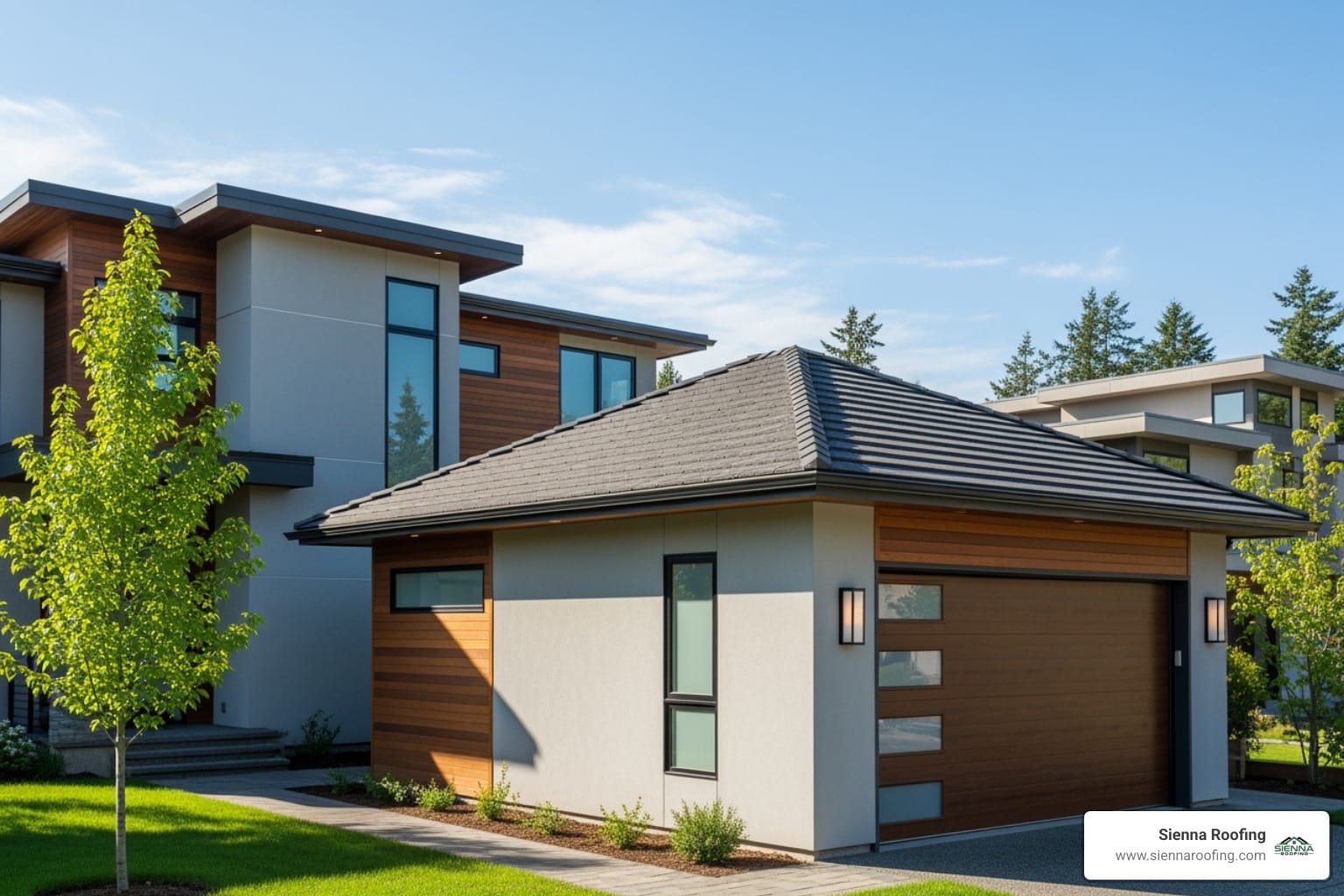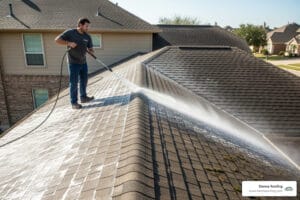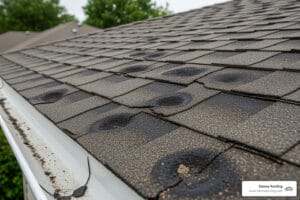Garage roof replacement price: Your Fair 2025 Guide
Garage Roof Replacement Costs: A 2024 Data-Driven Guide
The national average for a garage roof replacement price ranges from $2,390 to $5,560, with most homeowners paying approximately $3,970 for a standard two-car garage. While it may seem like a secondary concern compared to your home’s main roof, a new garage roof is a critical investment. It serves as the primary shield protecting your vehicles, tools, workshop, and stored belongings from the elements. For attached garages, a failing roof can become a direct conduit for water intrusion and pest infestation into your home’s primary structure, leading to far more expensive repairs. A sound, professionally installed garage roof directly impacts your property’s curb appeal and overall value, making it a key factor for potential buyers.
Understanding the variables that determine your final cost is the first step toward securing a fair price for high-quality roofing solutions. This guide provides a definitive breakdown of every component in a garage roof replacement quote, empowering you to budget effectively and hire with confidence.
Quick Price Breakdown by Garage Size:
This initial estimate helps set a baseline budget. These ranges account for common materials like asphalt shingles and standard labor rates.
- Small/Single-Car Garage (200-300 sq ft): $1,000 – $4,000. This typically covers a simple, detached single-car structure with a straightforward roofline.
- Medium/Two-Car Garage (400-500 sq ft): $1,600 – $5,500. This is the most common size, and the price range reflects variations in material quality and roof complexity.
- Large/Three-Car+ Garage (600+ sq ft): $2,400 – $7,200+. These larger structures often have more complex rooflines, potentially including hips, valleys, or dormers that increase labor and material costs.
Key Cost Factors at a Glance:
- Roofing Materials: This is a significant variable, with costs ranging from $3 per square foot for basic asphalt shingles to over $20 per square foot for premium standing seam metal or slate.
- Labor: Accounting for 40-60% of the total project cost, this covers the skilled team, their insurance, safety protocols, and the time required for tear-off, installation, and cleanup.
- Project Complexity: A simple, low-slope gable roof will cost less than a steep, multi-faceted roof with skylights or dormers.
- Underlying Structure Condition: The discovery of rotted decking or damaged rafters during tear-off can add unforeseen costs.
- Additional Costs: These include necessary but often overlooked items like building permits ($100-$500), old roof removal ($1-$5/sq ft), and debris disposal ($300-$800).
I’m Andre Castro, founder of Sienna Roofing, and I’ve overseen hundreds of garage roof replacement price evaluations throughout the Houston Metro area over the past five years. My hands-on approach is born from dealing with the unique challenges of our climate—from blistering sun and high humidity to the ever-present threat of hurricane-force winds. This experience ensures every homeowner understands exactly what they’re paying for and why certain materials and installation techniques are essential for long-term durability in Southeast Texas before we begin any work.
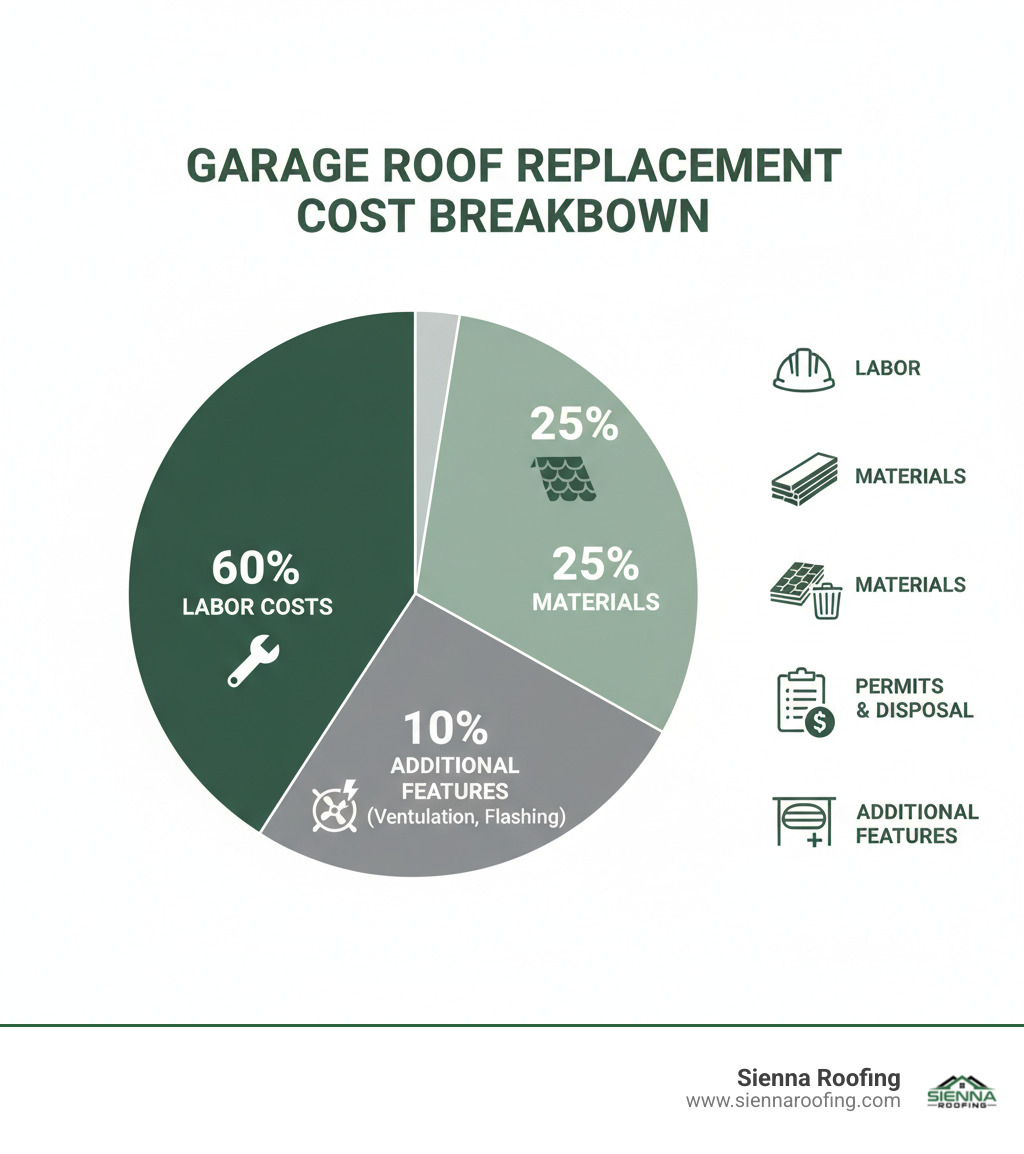
The 3 Key Factors Driving Your Garage Roof Replacement Price
When contractors provide a quote for your garage roof replacement price, the figure is based on several key variables. A lowball offer might seem tempting, but it often signals cut corners, subpar materials, or an uninsured operator. Understanding these core cost drivers helps you evaluate quotes intelligently and ensures you’re investing in services from a trusted residential roofing contractor that match your investment. Let’s break down exactly what influences your final price.
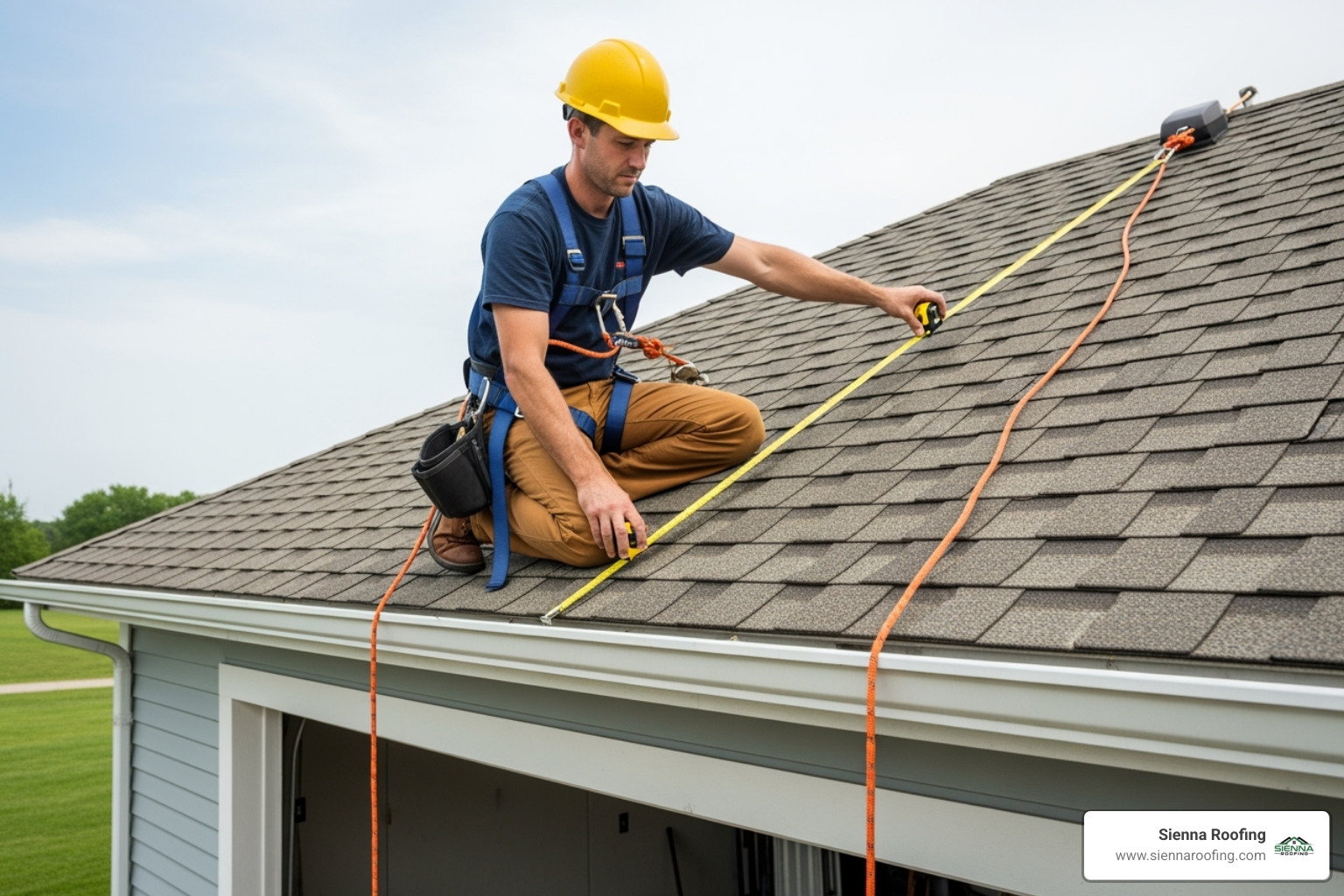
1. Garage Size and Complexity
The most direct factor affecting your garage roof replacement price is its total square footage. Roofing materials and labor are often calculated ‘per square’ (a 10×10 foot area, or 100 square feet). A single-car garage (200-300 sq. ft.) costs between $1,000 and $4,000, while a standard two-car garage (400-500 sq. ft.) costs $1,600 to $5,500. Large garages over 600 sq. ft. can range from $2,400 to $7,200 or more.
However, size is only part of the equation. Architectural complexity can significantly increase costs:
- Roof Pitch: A steeper roof is more dangerous and difficult to work on, requiring more safety equipment and slower, more methodical labor. Any pitch above a 6/12 (meaning the roof rises 6 inches for every 12 inches of horizontal run) will typically incur higher labor charges.
- Roof Design: A simple, low-slope gable roof is the most affordable to replace. In contrast, a hip roof (with four sloped sides) or a gambrel roof (like a classic barn) has more cuts, seams, and ridge caps, increasing both material waste and labor time.
- Penetrations and Features: Every element that breaks the plane of the roof adds cost. This includes skylights, chimneys, plumbing vents, and dormers. Each one requires meticulous flashing—the installation of custom-fit metal pieces to prevent leaks—which is a highly skilled and time-consuming task.
For example, a simple 450-square-foot gable roof might fall on the lower end of the price range. However, if that same-sized roof has a steep pitch, two dormers, and a skylight, the cost could easily jump by 30-50% due to the added labor and specialized materials required.
2. Labor and Professional Installation
Professional installation is the largest single expense, typically accounting for 40% to 60% of the total project cost. This is not an area to cut corners. This investment covers far more than just nailing down shingles. It includes:
- A Skilled and Experienced Crew: Professional roofers are trained to handle different materials, identify underlying issues, and apply materials according to manufacturer specifications to ensure your warranty remains valid.
- Safety and Insurance: A reputable contractor carries both general liability insurance and worker’s compensation. This protects you, the homeowner, from any financial liability in the event of an accident on your property. Their investment in OSHA-compliant safety equipment, like harnesses and scaffolding, is part of the labor cost.
- Full Project Management: The labor fee covers the entire process from start to finish: the careful tear-off of the old roof, site preparation to protect your landscaping and driveway, installation of all roofing system components, and a thorough cleanup and magnetic sweep for nails afterward.
Skilled roofers in the Houston area charge based on project complexity, material type, and regional labor rates. While a handyman might offer a lower price, they often lack the specific training, insurance, and equipment to guarantee a durable, long-lasting, and safe installation.
3. Your Garage Roof’s Current Condition
The state of the existing roof structure can introduce unforeseen but necessary costs. A professional roofer will perform a thorough inspection before finalizing a quote, but some issues can only be discovered after the old roofing material is torn off. These can include:
- Rotted Decking: The plywood or OSB sheathing that forms the base of your roof can rot due to long-term leaks. If an inspector finds soft, spongy spots, those sections must be cut out and replaced. This can add $100 to $250 per sheet of replaced decking.
- Damaged Rafters or Trusses: In severe cases, chronic water damage can compromise the structural framing of the roof itself. Sagging is a clear indicator of this. Repairing or reinforcing these structural elements is a significant job that can add $500 to $3,000 or more to the project total.
- Multiple Roof Layers: If previous owners simply installed a new roof over an old one, the tear-off process becomes much more labor-intensive and the disposal costs increase due to the extra weight and volume of debris. Most building codes allow a maximum of two layers, but a full tear-off is always the recommended practice.
Ignoring these structural issues will severely compromise the integrity and lifespan of your new roof. This is exactly why we conduct comprehensive evaluations before providing final quotes—nobody appreciates surprise costs, especially when they involve structural safety.
Roofing Material Costs vs. Lifespan: A Complete Breakdown
The material you select is the single biggest determinant of your final garage roof replacement price and the roof’s long-term performance. The climate in Texas—with its intense UV radiation, high humidity that promotes algae growth, and severe thunderstorms—makes this choice especially critical. The cheapest material today may lead to higher costs over the next two decades due to frequent repairs and an earlier replacement cycle. This breakdown compares the most popular garage roofing materials by upfront cost, lifespan, and performance in our demanding environment.
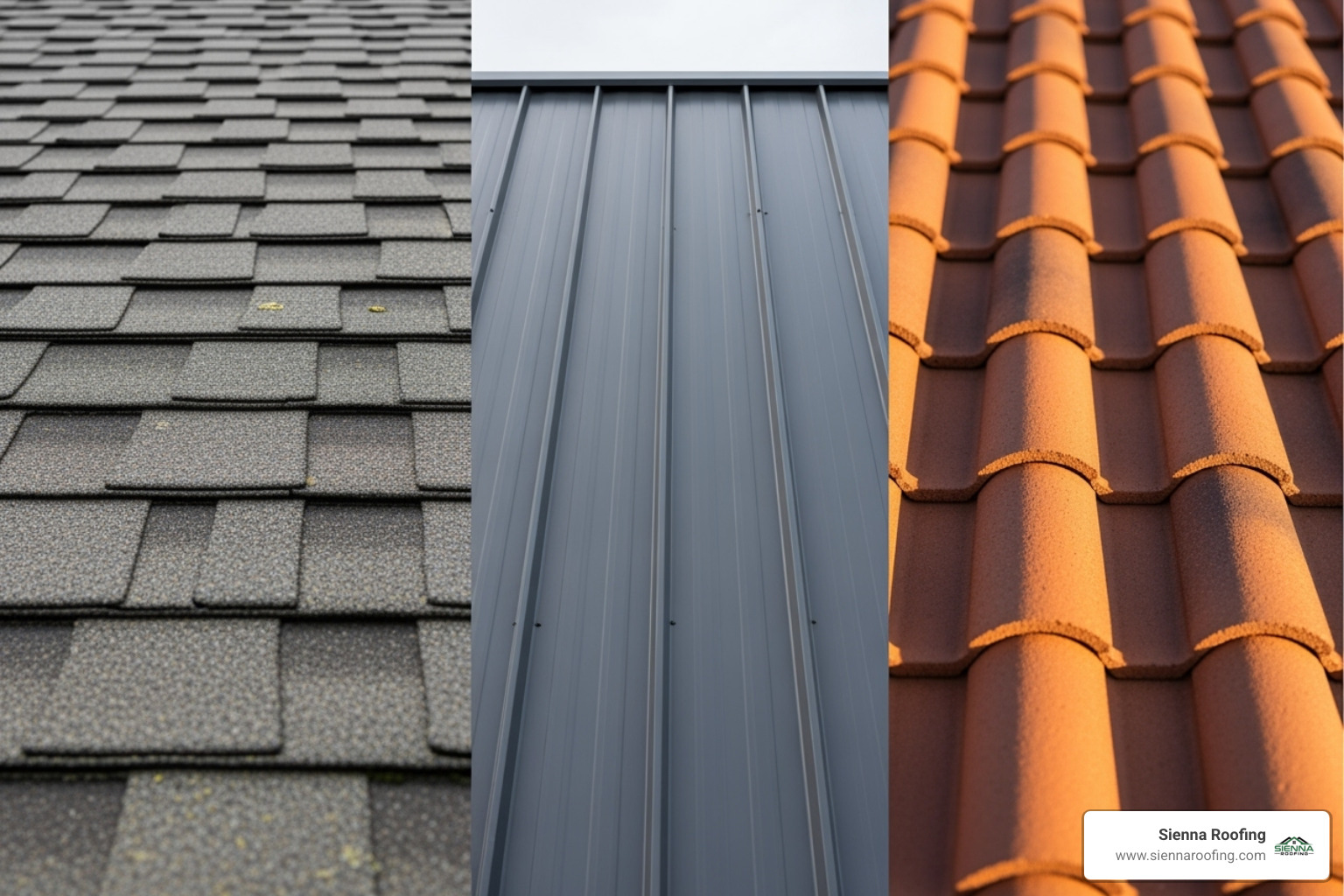
When we sit down with homeowners to discuss their options, we always emphasize that this isn’t just about the sticker price. The cheapest option today might cost you significantly more over the next two decades. Let’s break down the most popular garage roofing materials and what they mean for your budget, both now and in the future.
| Material Type | Cost per Sq. Ft. (Installed) | Lifespan (Years) | Pros | Cons |
|---|---|---|---|---|
| Asphalt Shingles | $3-$7 per sq. ft. | 15-30 years | Most popular choice, affordable, easy installation, wide variety of colors and styles, good weather resistance | Shorter lifespan than other materials, susceptible to wind damage, can fade over time |
| Metal Roofing | $7-$20 per sq. ft. | 40-70 years | Excellent durability, long lifespan, energy efficient (reflects solar heat), highly resistant to fire, wind, and hail, low maintenance | Higher upfront cost, can be noisy during rain/hail, requires specialized installation |
| Tile/Slate Roofing | $10-$30+ per sq. ft. | 50-200 years | Extremely durable, long lifespan, premium aesthetic, fire-resistant, excellent insulation | Very high upfront cost, heavy (may require structural reinforcement), fragile to walk on, complex installation |
| Modified Bitumen | $4-$7.50 per sq. ft. | 10-20 years | Flexible, UV-resistant, affordable flat roofing option, easy to repair | Shorter lifespan, can be prone to cracking in extreme temperatures, not suitable for pitched roofs |
| EPDM Membrane | $4-$10 per sq. ft. | 15-20 years | One of the least expensive membrane options, durable, adaptable, easy to install, ideal for flat roofs | Can puncture easily, less aesthetically pleasing, absorbs heat (black color) |
| TPO Membrane | $3.50-$14 per sq. ft. | 15-20 years | Energy-efficient (reflective surface), durable, resistant to punctures and tears, often used for commercial applications | Quality can vary between manufacturers, seam integrity is critical for performance |
Asphalt Shingles: The Affordable Standard
Asphalt shingles remain the go-to choice for most garage roofs due to their unbeatable balance of cost and performance. At $3 to $7 per square foot installed, they deliver solid protection without breaking the bank. We’ve installed thousands of square feet of asphalt shingles across Sugar Land and the greater Houston area, and they consistently prove their worth. There are three main types to consider:
- 3-Tab Shingles: The most basic and affordable option, characterized by a flat, uniform appearance. They typically have a lifespan of 15-20 years and lower wind resistance, making them suitable for budget-conscious projects on simple roofs.
- Architectural (Dimensional) Shingles: The most popular choice today. They are thicker, with a laminated, multi-dimensional look that adds curb appeal. They offer a longer lifespan (25-30 years), better wind resistance (up to 130 mph), and often come with algae-resistant properties, which is a major plus in humid Houston.
- Luxury Shingles: These are premium asphalt shingles designed to mimic the appearance of natural slate or wood shakes at a fraction of the cost and weight. They offer the longest lifespan and best durability in the asphalt category.
For more detailed information on various roofing costs and material options, our comprehensive guide on how much a new roof costs breaks down everything you need to know.
Metal Roofing: Durable and Long-Lasting
For homeowners seeking long-term value and superior performance, metal roofing is an excellent choice, especially in Texas’s harsh weather. While the upfront garage roof replacement price is higher—typically $7 to $20 per square foot—its incredible lifespan of 40 to 70 years makes it a cost-effective investment over time. Metal roofs are highly resistant to hail and high winds (often with the highest wind ratings available) and are exceptionally energy-efficient. Their reflective surfaces can lower cooling costs by 10-25%, a significant saving during our triple-digit summer days. We often recommend metal for garages used as workshops or to store valuable equipment due to its superior protection and minimal maintenance needs. Common types include:
- Standing Seam: A premium system with raised, interlocking seams and concealed fasteners that provides maximum weather resistance and a sleek, modern look.
- Exposed Fastener Panels: More economical than standing seam, these panels (like R-panel or PBR-panel) are durable and functional, often used for a more industrial or modern farmhouse aesthetic.
Flat Roofing Materials (EPDM, TPO, Modified Bitumen)
Garages with flat or low-slope roofs (a pitch of less than 2/12) require specialized membrane systems designed to be completely waterproof and prevent water pooling. The garage roof replacement price for these materials typically ranges from $3.50 to $14 per square foot, with lifespans between 10 and 30 years.
- EPDM (Ethylene Propylene Diene Monomer): Often called rubber roofing, EPDM is a durable and flexible synthetic membrane. At $4 to $10 per square foot, it offers excellent resistance to temperature swings. It is typically black, which can absorb heat, but white-coated versions are available.
- TPO (Thermoplastic Olefin): A popular, energy-efficient choice. TPO membranes are typically white and highly reflective, helping to keep the garage interior cooler. Costing $3.50 to $14 per square foot, their seams are heat-welded to form a monolithic, waterproof surface. The success of a TPO roof is highly dependent on the quality of the seam welding.
- Modified Bitumen: This is an asphalt-based material designed for flat roofs. It’s applied in rolls, often in multiple layers, and can be installed with torches (torch-down), cold adhesives, or as self-adhering sheets. At $4 to $7.50 per square foot, it’s a durable, tough, and proven mid-range option.
3 Hidden Costs of Garage Roof Replacement: Permits, Disposal, and More
When we sit down with homeowners to discuss their garage roof replacement price, we believe in complete honesty from day one. That means looking beyond just the shingles and labor to reveal the full picture of what a proper roof replacement actually involves. A professional quote will transparently itemize several essential services required for a durable, safe, and legally compliant installation. These are not optional upgrades but critical components of the project. When you receive a detailed roof replacement estimate, these items should be clearly outlined so you know exactly what you’re paying for.
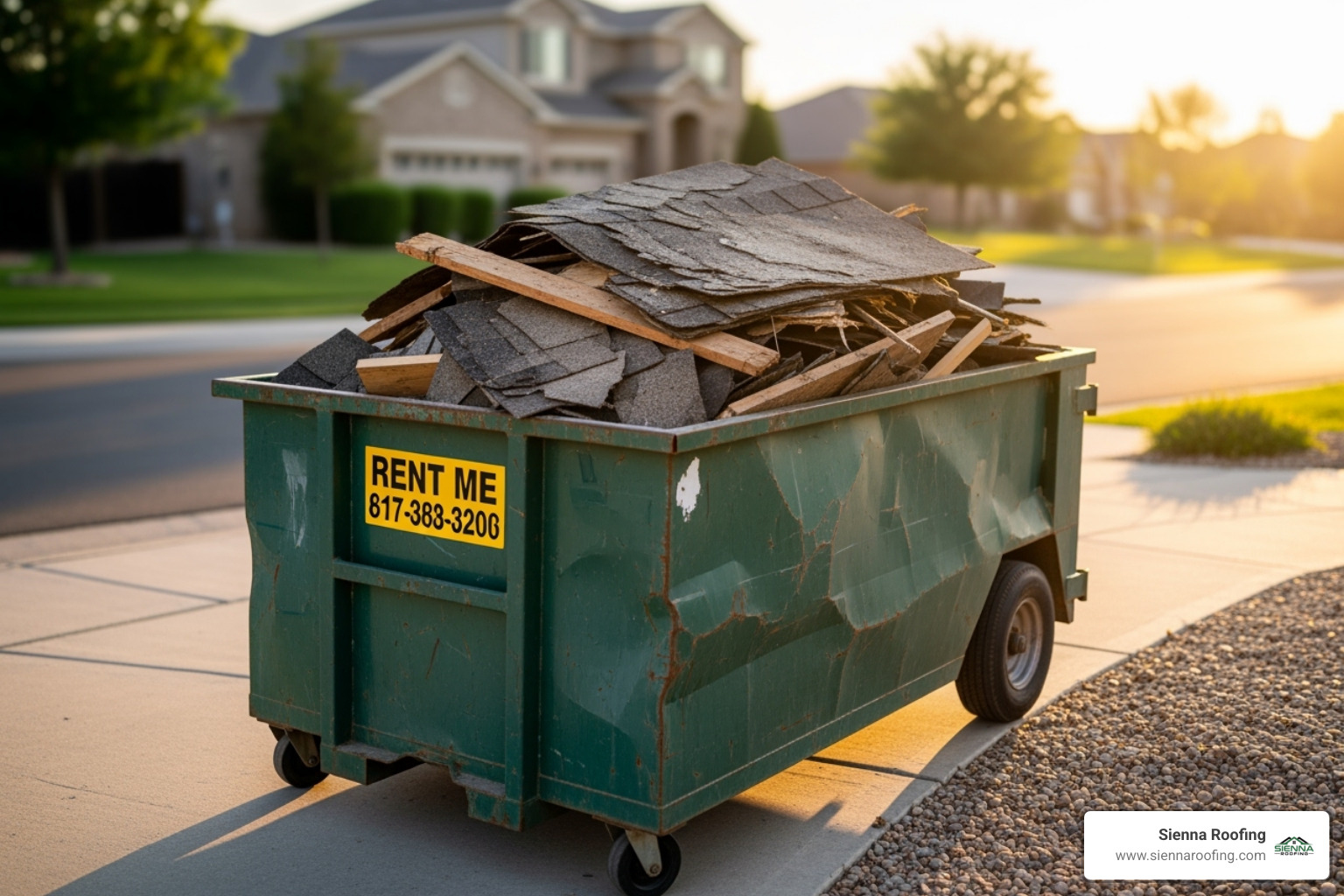
1. Old Roof Removal and Disposal
Before installing a new roof, the old one must be completely removed. This “tear-off” process adds $1 to $5 per square foot to the total cost. The price varies based on the material being removed and, most importantly, the number of existing roof layers. While it might seem cheaper to roof over the existing layer, it’s a bad practice that can void warranties, hide structural damage, and add excessive weight to your garage. After removal, disposal fees are incurred. Renting a dumpster for a roofing project typically costs between $293 and $800 for a week, and landfill charges average $40 to $60 per ton of debris. A professional contractor will factor these costs into the quote and handle all aspects of removal and disposal in compliance with local and environmental regulations.
2. Permits and Inspections
Most municipalities, including our home base in Sugar Land, TX, and surrounding areas, require building permits for roof replacement projects. Permit fees typically range from $100 to $500 and are a non-negotiable part of a legitimate roofing job. The permit ensures that the work will be done in compliance with current local building codes, which are designed to ensure safety, structural integrity, and weather resistance. In a hurricane-prone region like Houston, these codes often include specific requirements for nailing patterns and wind mitigation. After the job is complete (or sometimes at key stages), a city inspector will visit the site to verify the work was done correctly. This inspection process protects your investment, maintains your property’s value, and is often required by insurance companies for continued coverage. A professional roofer handles all the paperwork and scheduling for permits and inspections.
3. The Complete Roofing System: Flashing, Underlayment, and Ventilation
These components are the unsung heroes of your roofing system and are absolutely critical for its longevity. Skimping on these essentials is a recipe for premature roof failure, leaks, and mold growth.
- Flashing: These are thin pieces of metal (usually galvanized steel or aluminum) that are custom-bent and installed to direct water away from the most vulnerable areas of your roof. A proper flashing package, which can add $400 to $1,600 to a project, includes step flashing along walls, valley flashing in the V-shaped intersections of the roof, and flashing around chimneys or vents. A roof’s primary defense against leaks is its flashing system, not the shingles.
- Underlayment: This is a secondary water barrier installed directly onto the roof deck before the shingles go on. While traditional felt paper was the standard, modern synthetic underlayments are far superior. They are more tear-resistant, provide better water protection, and offer a safer walking surface for the installation crew. In addition, a special self-adhering membrane called an ice and water shield should be installed at the eaves, in valleys, and around penetrations to protect against wind-driven rain.
- Proper Ventilation: A garage, especially in Texas, can get incredibly hot. A balanced ventilation system is crucial for managing heat and moisture buildup. This system requires both intake vents (like soffit vents under the eaves) to draw cool air in and exhaust vents (like a ridge vent along the peak of the roof, or box vents) to let hot, moist air escape. Proper ventilation prevents the premature aging of shingles, reduces cooling costs if the garage is conditioned, and inhibits mold and mildew growth. Key components include a drip edge ($1-$3 per linear foot) to guide water into the gutters and a ridge vent system ($300-$650) for optimal exhaust.
Repair vs. Replace: The 50% Rule for Your Garage Roof
Homeowners often face the difficult decision of whether to patch up a damaged garage roof or invest in a full replacement. The correct financial choice depends on the roof’s age, the extent of the damage, and your long-term plans for the property. Minor repairs, such as fixing a small, isolated leak ($300-$800) or replacing a few shingles blown off in a storm ($200-$700), are cost-effective for a relatively new roof with years of life left. However, for a roof that is over 20 years old and showing widespread issues like extensive granule loss, sagging, or systemic shingle curling, replacement is almost always the smarter long-term investment.
The 50% Rule for Garage Roof Replacement Price
Here’s a simple but powerful guideline that has saved countless homeowners from throwing good money after bad: the 50% rule. If the estimated cost of repairs exceeds 50% of what a full garage roof replacement price would be, it is financially wiser to replace the entire roof. For example, if a new garage roof is quoted at $4,000 and the necessary repairs (for multiple leaks, widespread shingle replacement, etc.) are estimated at $2,500 (which is 62.5% of the replacement cost), investing that money in a brand-new roof provides decades of worry-free protection and is the better financial decision. This rule helps you avoid the frustrating and costly cycle of continuous repairs on a roof that is at the end of its functional life.
DIY vs. Hiring a Professional: A Cost-Benefit Analysis
The prospect of a DIY garage roof replacement can seem appealing, as it can theoretically reduce costs by 40% to 60% by eliminating labor expenses. For a 350-square-foot roof, this could mean saving nearly $1,000 in labor costs. However, this approach carries significant risks that often outweigh the savings:
- Improper Installation: This is the most common outcome of DIY roofing. Common mistakes include incorrect nail placement (under-driven, over-driven, or crooked nails that don’t seal), improper flashing installation around edges and penetrations, and failing to properly stagger shingle seams. These errors lead to persistent leaks, damage to your stored property, and will instantly void the manufacturer’s material warranty.
- Safety Hazards: Roofing is inherently dangerous work. Professionals are trained in OSHA-required safety protocols and use specialized equipment like harnesses, roof jacks, and safety ropes to mitigate the risk of falls. A DIYer not only risks serious injury from a fall but also faces electrical hazards from nearby power lines.
- Time and Tools: A professional crew can often tear off and replace a standard garage roof in a single day. A DIY project can stretch over multiple weekends, leaving your garage exposed to the elements. Furthermore, the cost of purchasing or renting the necessary tools (roofing nailer, compressor, shingle remover, safety gear) can eat into your projected savings.
For valuable insights into the benefits of professional installation, this guide from leading manufacturer GAF offers an excellent perspective.
How a New Garage Roof Adds Value
While the upfront garage roof replacement price is a significant investment, it adds substantial long-term value to your property in several ways:
- Return on Investment (ROI): National data from sources like Remodeling Magazine’s “Cost vs. Value” report consistently shows that a new roof offers one of the highest ROIs of any home improvement project, often recouping between 48% and 61% of its cost at resale.
- Curb Appeal and Marketability: A new garage roof, especially on an attached or prominent detached garage, instantly boosts your home’s curb appeal. For potential buyers, a new roof represents peace of mind and eliminates a major future expense, making your property significantly more attractive and easier to sell.
- Protection and Efficiency: Beyond financial returns, a new roof provides superior protection for the valuable assets stored in your garage. It can also improve energy efficiency, particularly if you opt for reflective metal or TPO roofing, which can reduce cooling costs in a workshop or conditioned garage space in hot climates like Texas.
How to Get a Fair and Accurate Garage Roof Replacement Quote
Armed with a thorough understanding of the factors that drive the garage roof replacement price, you are now prepared to confidently evaluate any quote you receive. Every component—from the specific type of materials and the scope of labor to the necessary additional costs like permits, disposal, and a complete ventilation system—plays a crucial role in the final figure. A trustworthy, professional quote will be transparent and itemize these details, so you can see exactly what you are investing in.
At Sienna Roofing, we believe transparency is the foundation of trust. Our detailed estimates break down every single cost, from the type of underlayment we use to the cost of the dumpster rental. We have served the Houston area for years, and our experience shows that homeowners value honesty and clear communication above all. With us, there are no surprise charges and no hidden fees—just straightforward pricing for exceptional work.
To ensure you hire a qualified and reliable contractor for your project, follow these steps:
- Get at Least Three Itemized Quotes: Don’t settle for a single bid. Comparing multiple detailed quotes will help you spot any outliers and understand the fair market rate for your project.
- Verify License and Insurance: Ask for proof of both general liability insurance and worker’s compensation. This is non-negotiable and protects you from liability. Verify their license with the local authorities if applicable.
- Check Local References and Reviews: Look for a contractor with a strong track record in your community. Read online reviews on Google and the Better Business Bureau, and don’t hesitate to ask for references from recent, local customers.
- Understand the Warranty: A proper roofing job comes with two warranties: the manufacturer’s warranty on materials (which can be voided by improper installation) and the contractor’s workmanship warranty on labor. Ensure you have both in writing.
Our community-driven approach means we treat every garage roof replacement as if it were for our own family’s property. We use high-quality materials from trusted manufacturers, employ skilled and insured craftsmen, and back every project with our 100% satisfaction guarantee. Whether you’re in Sugar Land, Missouri City, Richmond, or anywhere in the Houston metro, we’re committed to protecting your investment and enhancing your property’s value.
The garage roof replacement price for your project is unique, but our promise is a fair, accurate quote that reflects true professional workmanship.
Ready to find out what a quality garage roof replacement will cost for your property? Our process begins with a free, on-site inspection where we assess the condition of your current roof, take precise measurements, and discuss your material options and budget. Contact us today for a free, no-obligation estimate and experience the Sienna Roofing difference.
